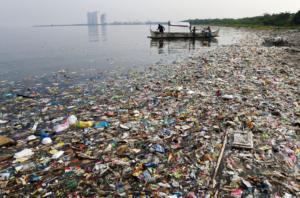 Adam never thought a single plastic bottle could cause any harm. Like many Nigerians, he finished his drink, tossed the empty bottle out of a moving vehicle, and went about his day. But that small act, repeated by millions daily, is slowly choking Nigeria’s water bodies, increasing floods, and threatening livelihoods and life underwater. The Lagos Lagoon, once a thriving natural resource, is now at risk. If we do not act now, we may lose it forever.
Adam never thought a single plastic bottle could cause any harm. Like many Nigerians, he finished his drink, tossed the empty bottle out of a moving vehicle, and went about his day. But that small act, repeated by millions daily, is slowly choking Nigeria’s water bodies, increasing floods, and threatening livelihoods and life underwater. The Lagos Lagoon, once a thriving natural resource, is now at risk. If we do not act now, we may lose it forever.
The Lagos Lagoon is the economic and ecological heartbeat of Nigeria’s coastal region, spanning over 6,354 square kilometers and supporting fishing, transportation, and tourism. But despite its importance, it is under relentless assault.
- 13,000 metric tonnes of waste are produced daily in Lagos, much of which ends up in drainage systems and ultimately flows into the lagoon.
- Studies reveal that the Lagos Lagoon now contains over 3.5 million microplastic particles per square kilometer, making it one of the most polluted water bodies in West Africa.
- Over 50% of industries in Lagos discharge untreated waste into the lagoon, introducing dangerous substances like lead and mercury into the water.
The result is a declining seafood industry, rising food prices, and an environmental crisis that affects millions.
The Hidden Cost of Pollution: Beyond the Water
The destruction of the Lagos Lagoon is not just an environmental problem—it is an economic and social disaster in the making.
- Economic Decline:
Once able to catch 10 to 20 kilograms of fish daily, many Lagos fishermen now struggle to bring in even five. More than 30,000 fishermen who depend on the lagoon are grappling with falling incomes and an increasingly uncertain future. - Food Security Threats:
The price of seafood has risen by over 50% in the past decade, making a once-affordable staple out of reach for many Nigerian households. - Worsening Flooding:
When plastic waste clogs drainage systems, water has nowhere to go—leading to the severe urban flooding that Lagos residents know all too well. The more we ignore waste management, the more we invite disasters that disrupt businesses, homes, and lives.
If nothing changes, the Lagos Lagoon will become an irrecoverable wasteland—and we will all bear the consequences.
Sustainability is Everyone’s Responsibility
Sustainability is a collective responsibility not solely a government or corporate concern. Every discarded bottle, untreated industrial discharge, or neglected waste management policy, pushes us closer to an environmental catastrophe.
But there is still hope. To reverse this trend, we must:
- Improve waste disposal habits—Individuals must dispose of waste properly and recycle it whenever possible.
- Enforce stricter regulations—Policymakers must hold businesses accountable for pollution and promote sustainable waste management.
- Invest in public awareness—People must understand that small daily actions have long-term consequences.
CSR-in-Action: Driving Real Change for a Sustainable Future
At CSR-in-Action, we are not just talking about sustainability, we are driving it.
- Environmental Advocacy: We champion policies that promote responsible waste management and corporate accountability.
- Stakeholder Engagement: We collaborate with businesses, government agencies, and communities to drive change.
- Sustainability Leadership: We provide research, training, and policy recommendations to ensure that Nigeria builds a sustainable, thriving economy.
But we cannot do it alone. It is time for businesses, individuals, and policymakers to step up.
If we act now, the Lagos Lagoon can be restored. If we do not, future generations will inherit a wasteland instead of a resource. The choice is ours.

